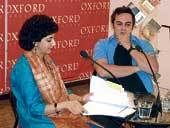 |
| Zilka Joseph and Shaun Kenworthy at the bookstore |
Titled Eating Poetry, the evening at Oxford Bookstore featured Zilka Joseph, who read from her collection of poems Lands I live in. “Eating”, of course, was not a verb, but an adjective. Joseph, from Michigan, who grew up in Calcutta, was reading poems featuring food and conversing intermittently with chef Shaun Kenworthy.
Anyone who lived a full life could not ignore food, said Joseph, a petite woman with a mass of frizzy hair, who teaches workshops in Detroit and at the University of Michigan. Indeed. The best of literature has often been about food. Ogden Nash says in The Clean Platter: “By undraped nymphs/ I am not wooed;/ I’d rather painters painted food./ Food,/ Just food,/ Just any old kind of food.” In Further Reflections on Parsley, he just says: “Parsley/ Is gharsley.”
The city’s very own Sukumar Ray, who, many feel, ranks among the world’s greatest humour writers, had concluded: “Kintu shobar chaite bhalo, pauruti aar jhola gur” (But the best bet/ Is runny jaggery and bread).
Food is not only fun; it is sensuous, lusty, erotic; and gives insights into the eater.
Joseph’s poetry is spicy. And tactile. You can almost hear the bone crunch as she describes her father biting into a chicken breast in the poem Kaulee haddi: “My father loves boki flesh,/ tender breast meat steeped in flavour,/ falling off the triangle of translucent bone./ The supple end curves to a pliant/ tongue drunk with masala —/ ginger warm, garlic sharp,/ coriander mellow.” “…his wiry engineer fingers/ salty with memories of sea,/ flecked with rice and curry…” it continues.
The press release adds: “(Joseph’s collection) has poems on the humble ‘dhania patta’ and ‘green chillies’.”
Joseph reads her poems gently, her soft, measured tone holds up her words well, as the soft lights of the bookstore and the select gathering make the evening pleasant. But one wonders a little about the nature of the spices in her poems.
Isn’t curry masala, with tropical fruits, being used too liberally in the works of authors or film-makers of Indian origin with a global readership or audience? Mistress of Spices, Mississippi Masala, Hullabaloo in the Guava Orchard, Bhaji on the Beach…. Maybe the Indian poet, and writer, and film-maker, could serve some blander, mundane everyday dishes, better for the stomach? Things like shukto or sattu?
Novel comeback
Sankar’s popular novel Jana Aranya, which was made into a film by Satyajit Ray, is now available in translation in English. It has been translated by Arunava Sinha and published by Penguin.
Jana Aranya’s translation follows the success of the English version of Chowringhee, also translated by Sinha. Jana Aranya is about urban corruption and its effect on the youth of the 70s. “I felt rampant corruption all around and I didn’t think there was any solution. I was only waiting… for a story that would give me an opportunity to show this,” Ray had said of the novel.
Says Sankar: “I never expected that my work will reach such a large audience so many years after they were written. I am truly overwhelmed. It’s the universality of certain themes that makes novels popular at all times.”










